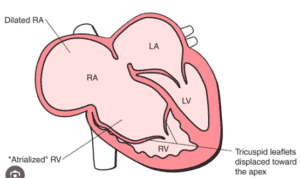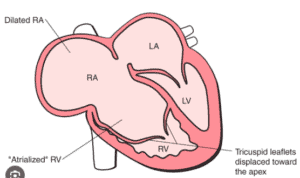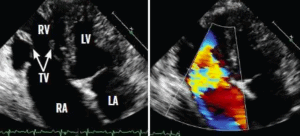
Labrador Retrievers are one of the most popular dog breeds in the world, known for their loyalty, intelligence, and friendly nature. However, like all dogs, Labradors are susceptible to various health issues, including chronic valve disease, which is a common cause of heart murmurs in this breed. This is referred to by Labrador breeders as TVD or Tricuspid valve dysplasia.
Chronic valve disease is a condition that affects the heart’s valves, which control the flow of blood through the heart. The valves can become thickened and deformed over time, causing them to leak or not close properly, or regurgitate blood through a deformed valve. This can lead to a heart murmur, which is an abnormal sound heard during a physical examination of the heart. If it’s slight it may never affect your dog, but if it’s extreme, then a dog should not be bred, and all breeding stock must be examined by a canine cardiologist to diagnose such a condition, which we do, as breeders, to clear all of our breeding stock. It’s very expensive to do the exam and use an echo Doppler, but responsible breeders will invest in this step as its necessary in expelling this disease from the breed.
The exact cause of chronic valve disease in Labradors is not fully understood, but it is believed to be a combination of genetic and environmental factors. Some studies have suggested that certain breeding lines may be more prone to the condition, while others have linked it to factors such as diet, exercise, and exposure to toxins.
Symptoms of chronic valve disease can vary depending on the severity of the condition but may include coughing, difficulty breathing, fatigue, and fainting. In some cases, there may be no visible symptoms at all, making regular check-ups with a veterinarian essential for early detection and treatment.
Treatment for chronic valve disease typically involves managing symptoms and slowing the progression of the condition. This may include medications to help regulate the heart’s rhythm and reduce fluid buildup, as well as dietary changes to support heart health. In severe cases, surgery may be necessary to repair or replace damaged valves.
Preventing chronic valve disease in Labradors can be challenging, but there are steps that owners can take to minimize the risk. This includes making sure your breeder is screening for this defect, feeding a balanced and nutritious diet, providing regular exercise, avoiding exposure to toxins, and scheduling regular check-ups with a veterinarian.
Article property of Donna Stanley, owner, Endless Mt. Labradors (www.emlabradors.com)

